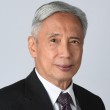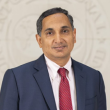Tuesday, Apr 11, 2023 | 11:30 AM - 12:00 PM
Location: Cedar Hall, HQ1-1-660
SPEAKER
 |
||
| Felipe Medalla Governor of the Bangko Sentral ng Pilipinas |
||
Dr. Felipe Medalla, a noted economist and educator whose career spans more than four decades and four administrations, is the current Governor of the Bangko Sentral ng Pilipinas. Dr. Medalla has been a member of the policymaking Monetary Board since July 2011, having been appointed by former President Benigno Aquino III and President Rodrigo Duterte in July 2017.
Before joining the Monetary Board, he was a prominent figure in the academe, having taught at the University of the Philippines-School of Economics (UPSE) from 1991 to 2011. He also served as UP vice president of planning and finance from 1988-1991 before being named dean of UPSE from 1994-1998. In 1998, Dr. Medalla was appointed Secretary of Socio-Economic Planning and Director-General of the National Economic and Development Authority by then-President Joseph Estrada. He earned his Ph.D. in Economics from Northwestern University in Evanston, Illinois and his M.A. in Economics from the University of the Philippines. A certified public accountant, he graduated cum laude from De La Salle University with an economics- accounting degree.
MODERATOR
 |
||
| Krishna Srinivasan Director, Asia and Pacific Department (IMF) |
||
Krishna Srinivasan is the Director of the Asia and Pacific Department (APD). In this capacity, he will oversee the institution’s work on all countries in the Asia-Pacific region. He was previously a Deputy Director in APD, overseeing the work on several systemically important countries, including China and Korea. Prior to that, Krishna was a Deputy Director in the Western Hemisphere Department (WHD), where he oversaw the institution’s work on several countries in the Americas, including Brazil, Canada, Mexico, Peru, Ecuador and the island economies of the Caribbean, the department’s research activities, and its flagship product, Regional Economic Outlook (REO) for Latin America and the Caribbean. He is a co-editor of two recent books: Brazil—Boom, Bust and the Road to Recovery; and Unleashing Growth and Strengthening Resilience in the Caribbean. Before joining WHD, Krishna was the IMF’s mission chief for the United Kingdom and Israel, when he was a staff member of the European Department, and before that in the Research Department, where he led the IMF’s work on the G-20 in the context of the global financial crisis. In the context of this work, he and was the editor of an IMF book Global Rebalancing: A Roadmap for Economic Recovery. Krishna has been with the IMF since 1994 and has served in several departments across the institution. He secured his PhD in International Finance from Indiana University and a Master’s from the Delhi School of Economics, India, and has published several papers both at the IMF and in leading academic journals.
SUMMARY
Key Points:
Quotes:
“ It’s very important that the public knows why the central bank is doing what it’s doing. Also, people have to understand that some degree of exchange rate volatility is actually quite useful.” Felipe Medalla (9:57-10:23)
Contributor: Fares Rawah
PHOTOS